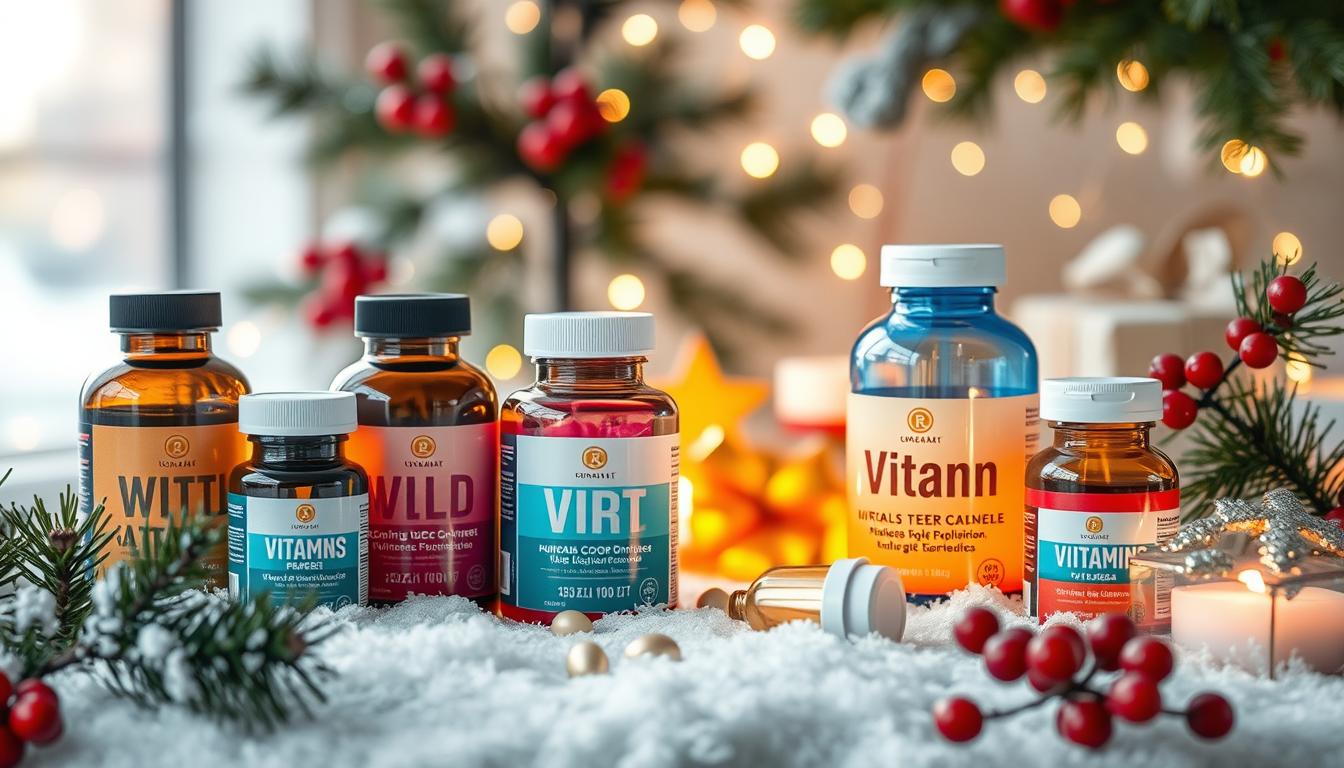How to Avoid Holiday Fatigue during the festive season is something everyone should focus on. While the holidays bring plenty of joy, they can also leave us feeling drained. One of the best ways to avoid holiday fatigue is by turning to specific vitamins that can help boost energy levels and support overall well-being. In this article, we’ll dive deeper into how to avoid holiday fatigue naturally and effectively using nutrient-rich foods and supplements.
The hustle and bustle of the season can take a toll on our bodies, making many wonder how to avoid holiday fatigue. From shopping sprees to family gatherings, our energy reserves often run low. But don’t worry! With the right strategies, you can effectively manage how to avoid holiday fatigue and keep your energy levels steady through the festivities.
Imagine sailing through the holidays with ease and energy. It’s possible when you know how to avoid holiday fatigue by nourishing your body with the right vitamins. In this guide, we’ll explore seven essential vitamins that can help you avoid holiday fatigue and stay full of vitality throughout the season. These energy-boosting nutrients will be your secret weapon for enjoying every moment of the festivities.
This approach will help you face the holidays with renewed energy and enthusiasm, staying energized and healthy all season long while learning how to avoid holiday fatigue.
. We’ll explore the science behind holiday fatigue and guide you on creating a sustainable vitamin routine. This approach will help you face the holidays with renewed energy and enthusiasm, staying energized and healthy all season long.
Key Takeaways
- Vitamin C supports adrenal function, crucial for stress management
- Quality multivitamins help replenish depleted nutrients during busy times
- Protein-rich snacks prevent fatigue and provide on-the-go energy
- Vitamin B12 boosts energy levels by supporting red blood cell production
- Adequate sleep (7-9 hours) is essential for overall well-being
- Regular physical activity enhances energy and reduces stress
- A balanced diet rich in fruits, vegetables, and whole grains supports holiday vitality
Understanding Holiday Fatigue and Its Impact on Health
The festive season brings joy, but it can also lead to holiday fatigue symptoms. This exhaustion affects both body and mind. It often results from the stress of holiday preparations and celebrations. Let’s explore how this seasonal tiredness impacts our well-being.
Physical Symptoms of Holiday Exhaustion
Holiday fatigue often manifests in physical discomfort. Common signs include headaches, body aches, and sleep disturbances. These symptoms can leave you feeling drained and less able to enjoy the season’s festivities.
Mental and Emotional Effects
The mental toll of holiday stress can be significant. Many experience irritability, sadness, and heightened anxiety. These emotional challenges can dampen the holiday spirit and make it hard to fully engage in celebrations.
How Stress Affects Hormone Balance
Prolonged holiday stress can lead to cortisol disruption. This hormone imbalance may cause weight gain, mood swings, and sleep issues. In severe cases, it can even contribute to adrenal dysfunction, further exacerbating fatigue.
“The key to managing holiday fatigue is recognizing its impact and taking steps to maintain balance.”
To avoid holiday fatigue, focus on quality sleep, balanced nutrition, and regular exercise. Aim for 7-8 hours of sleep nightly and stay hydrated. Consider supplements like Vitamin C, Zinc, and Vitamin D3 to support your immune system. Relaxation techniques such as meditation can also help manage stress and preserve your holiday cheer, making it easier to avoid holiday fatigue.
The Science Behind Energy Depletion During Festive Seasons
How to Avoid Holiday Fatigue: Understanding the Science Behind Energy Depletion
The holiday season brings joy, but it can also lead to energy depletion. Understanding how to avoid holidaUnderstanding how to avoid holiday fatigue involves recognizing how changes in diet, sleep, and stress affect how our bodies use energy. By addressing these factors, you can keep your energy levels balanced during the festivities. Fatigue involves recognizing how changes in diet, sleep, and stress affect how our bodies use energy. By addressing these factors, you can keep your energy levels balanced during the festivities.
Festive foods often cause blood sugar spikes and crashes. This leaves us feeling drained. It affects our energy balance more than just making us tired.
Sleep deprivation is common during the holidays. Adults need 7-8 hours of sleep each night for health. Not getting enough sleep activates our stress response, using up our energy.
Nutrient deficiencies also play a big role in How to Avoid Holiday Fatigue. Busy schedules can lead to skipped meals or poor choices. This can cause a lack of vitamins and minerals, making it hard to keep up with holiday demands.
| Factor | Impact on Energy | Solution |
|---|---|---|
| Diet Changes | Blood sugar fluctuations | Balance treats with nutrient-rich foods |
| Sleep Disruption | Depleted energy reserves | Maintain 7-8 hours sleep routine |
| Nutrient Deficiencies | Impaired energy metabolism | Focus on balanced, nutrient-dense meals |
Understanding these factors helps us make choices to keep our energy up during the holidays. By focusing on balanced meals, enough sleep, and managing stress, we can enjoy the season without feeling fatigued.
How to Avoid Holiday Fatigue with Vitamin B Complex: Your Energy Powerhouse
The holiday season can leave you feeling drained, but learning how to avoid holiday fatigue with B-complex supplements is one of the most effective ways to boost your energy. These vitamins are your body’s energy powerhouse, providing the fuel you need to keep up with festive gatherings, late-night gift wrapping, and everything in between.
B12 for Sustained Energy Levels
Vitamin B12 does more than boost energy. It helps make red blood cells and aids in metabolism. Salmon is a great source, offering over 200% of your daily B12 needs. For vegetarians, nutritional yeast is a good choice, providing 310% of the daily value in just 5 grams.
B6 for Stress Management
Vitamin B6 helps manage holiday stress. It helps make neurotransmitters that control mood and stress. You can find B6 in foods like avocados, which offer 30% of the daily value. B-complex supplements also provide a convenient boost.
Thiamine and Riboflavin Benefits
Thiamine (B1) and riboflavin (B2) are key for turning food into energy. Pork tenderloin is a great source of thiamine. Whole milk provides 30% of your daily riboflavin needs. These vitamins keep your energy stable all day.
B vitamins are important for supporting skin health. They help with hydration and elasticity. Adding B-complex supplements to your routine boosts energy and promotes wellness during the holiday season.
| B Vitamin | Daily Value (DV) | Top Food Source | % of DV in Food Source |
|---|---|---|---|
| B12 (Cobalamin) | 2.4 micrograms | Salmon | 200% |
| B6 (Pyridoxine) | 1.3 milligrams | Avocado | 30% |
| B1 (Thiamine) | 1.1 milligrams | Pork Tenderloin | 70% |
| B2 (Riboflavin) | 1.1 milligrams | Whole Milk | 30% |
How to Avoid Holiday Fatigue: 7 Essential Vitamins and Minerals to Keep Your Energy
The holiday season can be draining, but with the right energy-boosting nutrients, you can sail through festivities feeling your best. Let’s explore seven vital vitamins and minerals that can help you combat holiday fatigue and maintain your energy levels.
The B-complex family is first on our list. These vitamins are crucial for energy production in your body. Vitamin B12 supports sustained energy levels, while B6 aids in stress management. Including B-rich foods like whole grains and lean meats in your diet can make a significant difference.
Vitamin C is your go-to for adrenal support and immunity. It’s not just for fighting colds; it also helps your body cope with stress. Citrus fruits, bell peppers, and broccoli are excellent sources. For those considering holiday vitamin supplementation, a daily dose of 500-1000mg of Vitamin C can be beneficial.
Don’t forget about Vitamin D, especially during winter when sunlight is scarce. It regulates mood and supports overall wellness. Fatty fish, egg yolks, and fortified foods can help boost your levels. Iron is another must-have to prevent fatigue-inducing anemia. Lean meats, beans, and leafy greens are iron-rich options.
How to Avoid Holiday Fatigue:
- Magnesium for Relaxation and Stress Reduction
One of the best ways to avoid holiday fatigue is by ensuring you get enough magnesium. - Zinc to boost immune health
- Omega-3 fatty acids for brain function and mood stability
Incorporating these energy-boosting nutrients through a balanced diet or targeted holiday vitamin supplementation can significantly improve your vitality during the festive season. Remember, a varied diet rich in natural foods is the best approach, with supplements filling in any nutritional gaps.
Vitamin C: Supporting Adrenal Function and Immunity
How to Avoid Holiday Fatigue: The Role of Vitamin C in Supporting Adrenal Function
Vitamin C plays a critical role in how to avoid holiday fatigue by supporting adrenal function and boosting immunity. During the stressful holiday season, optimal vitamin C intake helps reduce fatigue and keep you feeling energized and healthy.
Optimal Dosage Recommendations
Adults should aim for 500 to 2000mg of vitamin C daily. This supports adrenal and immune health. During stressful times, like the holidays, more vitamin C can fight fatigue and irritability.
Natural Food Sources
Eating foods rich in vitamin C is a great way to get its benefits. Here are some top sources:
- Citrus fruits (oranges, grapefruits, lemons)
- Berries (strawberries, blueberries, raspberries)
- Leafy greens (kale, spinach, broccoli)
- Bell peppers
- Kiwi fruit
Supplementation Guidelines
Vitamin C is crucial in adrenal support supplements. For better absorption, take it in divided doses. Liposomal vitamin C is a top choice for its high bioavailability.
| Supplement Type | Recommended Dosage | Best Time to Take |
|---|---|---|
| Regular Vitamin C | 500-1000mg, 2-3 times daily | With meals |
| Liposomal Vitamin C | 500-1000mg, 1-2 times daily | On an empty stomach |
| Buffered Vitamin C | 500-1000mg, 2-3 times daily | With or without food |
Vitamin C is water-soluble, so your body doesn’t store it. Regular intake is essential for adrenal and immune health, especially during stressful times like the holidays.
Magnesium: The Relaxation Mineral
Magnesium is key in fighting holiday fatigue and stress. It supports over 300 body functions, making it vital for health. When stress goes up during the holidays, magnesium helps keep you calm and energized.
Magnesium is not just a trend; it’s scientifically proven. It helps with neurotransmitters, blood sugar, and muscle relaxation. That’s why it’s called a top stress-reducing mineral.

The daily magnesium need is 420 mg for men and 320 mg for women over 31. Yet, many adults don’t get enough. You can increase your magnesium by eating magnesium-rich foods or taking supplements.
| Food Source | Magnesium Content (per 100g) |
|---|---|
| Pumpkin seeds | 592 mg |
| Almonds | 270 mg |
| Spinach | 79 mg |
| Dark chocolate | 228 mg |
If you need more magnesium, supplements can help. Magnesium glycinate and magnesium threonate are good choices because they’re easily absorbed. Taking magnesium at night can help you relax and sleep better, making you feel refreshed for holiday fun.
“Magnesium is the ultimate relaxation mineral. It’s nature’s own chill pill, helping us unwind from the holiday hustle and bustle.”
By focusing on magnesium, you help your body fight holiday stress and tiredness. A well-rested you is a happier you!
Vitamin D: Maintaining Winter Wellness
Winter brings cold days and holiday joy, but it can also cause vitamin D deficiency. This important nutrient helps with mood and health. Here are some tips to keep your vitamin D levels up when it’s dark outside.
Sunlight Exposure Recommendations
Getting some sun is the best way to increase vitamin D. Try to spend 10-30 minutes in the sun at midday a few times a week. The time needed varies based on your skin and where you live. Even on cloudy days, you can still get some vitamin D.
Supplementation Strategies
When it’s hard to get sun, supplements can help. Most adults need 1000-4000 IU daily. It’s a good idea to check your levels with a doctor to find the right amount. Taking vitamin D with a meal can help your body absorb it better.
Food Sources Rich in Vitamin D
Eating foods high in vitamin D is another good way to avoid deficiency. Add these to your meals:
- Fatty fish like salmon and mackerel
- Egg yolks
- Fortified dairy products
- Mushrooms exposed to UV light
| Food Source | Vitamin D Content (IU per serving) |
|---|---|
| Salmon (3 oz) | 447 |
| Fortified milk (1 cup) | 120 |
| Egg yolk (1 large) | 41 |
| UV-exposed mushrooms (1/2 cup) | 366 |
By using sun, supplements, and vitamin D-rich foods, you can keep your levels right even in the darkest winter. This approach fights fatigue, boosts your immune system, and keeps your mood up during the holidays.
Sleep Quality and Nutrient Absorption
Getting enough sleep is key for your body to absorb nutrients well. During the holidays, it’s easy to skip sleep, leading to fatigue and poor health. Let’s look at some holiday sleep tips and ways to improve nutrient absorption.

Adults need seven to eight hours of sleep each night for the best rest. Not getting enough sleep can raise health risks like high blood pressure and depression. To sleep better, try these nutrient-rich foods:
- Bananas: Rich in tryptophan, which helps produce melatonin and serotonin
- Almonds and walnuts: Contain melatonin and magnesium for stress reduction
- Kale: High in calcium, supporting melatonin production
To improve nutrient absorption, time your vitamin intake right. Take vitamin D with a large meal or fat source early in the day to boost energy. Avoid red meat, fried foods, sugar, and caffeine before bed to sleep better.
If stress is keeping you awake, think about taking magnesium citrate or B-complex vitamins. Exercise regularly to lower stress hormones and improve sleep. Good sleep and nutrient absorption are both important for energy during the holiday rush.
Creating a Sustainable Vitamin Routine
Keeping your energy up during the holidays is all about your vitamin routine. A smart plan for when to take your supplements can really help. It makes a big difference in how you feel all day.
Morning Supplement Schedule
Begin your day with B-complex vitamins and vitamin C. These vitamins give you a boost and work best with breakfast. If you’re taking iron, take it first thing in the morning. This helps your body absorb it better.
Evening Vitamin Timing
Evening is for unwinding. Take magnesium and vitamin D with dinner. They help you relax and prepare for a good night’s sleep.
Meal Coordination Tips
Take fat-soluble vitamins (A, D, E, K) with meals that have healthy fats. This makes them easier to absorb. But, don’t take calcium and iron together. They can block each other’s absorption.
| Time of Day | Supplements | Meal Pairing |
|---|---|---|
| Morning | B-complex, Vitamin C, Iron | With breakfast (except iron) |
| Evening | Magnesium, Vitamin D | With dinner |
| With Fatty Meals | Vitamins A, D, E, K | Any meal with healthy fats |
Being consistent is key to a good vitamin routine. Use a pill organizer or reminders to stay on schedule. With these tips, you’ll keep your energy up all holiday season.
Lifestyle Strategies to Complement Vitamin Intake
Boost your energy and tackle holiday stress with these simple tweaks. Adding these strategies to your vitamin routine will help you enjoy the festive season. You’ll feel refreshed and vibrant.

Start your day with a quick 15-minute workout. It’s a great way to kickstart your metabolism and lift your mood. Try a brisk walk, some jumping jacks, or a short yoga session. Regular exercise is key to maintaining energy levels and managing stress.
Make time for relaxation. Deep breathing exercises or meditation can work wonders for your mental state. Even five minutes of quiet time can help reset your mind and reduce holiday-related anxiety.
Fuel your body right. Eating nutritious meals is crucial for sustained energy. Load up on fruits, veggies, lean proteins, and whole grains. Stay hydrated by sipping water throughout the day.
Prioritize sleep. Aim for 7-9 hours each night to keep your immune system strong and energy levels high. Cut back on caffeine and screen time before bed for better sleep quality.
- Take short breaks during busy days
- Practice saying ‘no’ to avoid overcommitting
- Engage in hobbies you enjoy
- Connect with loved ones for emotional support
Remember, these energy-boosting activities work hand in hand with your vitamin intake. By adopting these habits, you’ll be better equipped to handle holiday stress and enjoy the season to its fullest.
Common Mistakes to Avoid When Supplementing
Taking vitamins and minerals can boost your health. But, it’s important to do it correctly. Let’s look at some common mistakes and safety tips to help you use supplements wisely.
Timing Errors
One common mistake is taking supplements at the wrong time. Fat-soluble vitamins need food to work well. Iron supplements shouldn’t be taken with calcium-rich meals, as it can reduce absorption. Plan your supplement schedule carefully to get the best results.
Dosage Misconceptions
Many think more vitamins are better. But, this is not true! Taking too much can cause harm. For example, too much vitamin A can lead to headaches and skin problems. Always follow the recommended dosage unless your doctor tells you otherwise.
Interaction Awareness
It’s important to know about vitamin interactions. Some supplements can affect medications. For example, vitamin K can impact blood thinners, and St. John’s Wort can affect many drugs. Always talk to your doctor before starting new supplements, especially if you’re on medication.
“Nearly 20% of patients seeking a physician’s assistance for a health concern report fatigue as a symptom.”
Remember, supplements are meant to add to a healthy diet, not replace it. Why not try some Spanish-inspired dishes to naturally increase your nutrient intake? By avoiding these mistakes and following safety tips, you’ll be on your way to a more balanced and energized life.
Conclusion
As we finish our guide on holiday wellness strategies, remember that keeping your energy up during the festive season is possible. Adding essential vitamins and minerals to your daily routine is a great start. NextCare, with its 170+ clinics across 12 states, is ready to help with your urgent care needs.
Important tips for keeping your energy up include eating lots of fruits and veggies, cutting down on sugary and alcoholic drinks, and exercising regularly. Don’t forget the benefits of B vitamins, omega-3 fatty acids, and vitamin D for your mood and stress levels. Magnesium, zinc, and good hand hygiene are also key for your holiday wellness.
For seniors, getting flu vaccines, staying active indoors, and connecting with loved ones are especially important. Remember, taking care of your health is a gift to yourself and others. By following these tips, you’re not just avoiding fatigue. You’re embracing the joy and energy of the season.

